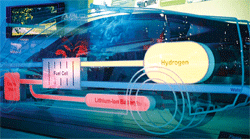Carmakers are investing a lot of time and money in developing alternative fuel technologies, but they are still unsure which technology—if any—will step to the forefront.
Strolling around the floor of the recent International Auto Show in New York, I quickly noticed that carmakers are heavily invested in researching and developing alternative fuel technologies. Excepting the producers of the very-high-end Lamborghinis, Ferraris, and Bentleys, most carmakers proudly and prominently displayed their various concepts and advancements in hybrid, fuel-cell, hydrogen, biodiesel, and other technologies.
And the stats seem to bear this out. According to the Hybrid Market Dashboard at http://hybridcars.com, hybrid automobiles may finally be coming into their own. For instance, in March, Prius sales were up about 57% over the prior month.
However, as I spoke with some of the reps on the floor, I began to realize that the automotive industry is sort of in limbo right now, waiting to find out which technology—if it is to be only one—will rise above the rest. Upon finding out I write for an electronics magazine, one product specialist from Saturn pointedly asked me which technology I thought would be dominant. I informed him that I was hoping he was going to let me in on that secret.
Part of the problem is that we may be stuck in somewhat of a chicken-and-egg situation. The move, or decision, or however it plays out, will be based on what choices consumers make. But consumers want guidance, too. They’re waiting to be told by carmakers that these new technologies not only work, but they’re inexpensive, safe, and perform well.

To their credit, car companies are forging ahead with research to figure out how to make alternative-fuel technologies a reality. About five of Honda’s FCX fuel-cell cars have been on the road since 2002. Chevy‘s Project Driveway program will put about 100 of Chevy’s Equinox Fuel Cell vehicles in three metropolitan areas for evaluation, and BMW is planning something similar with the Hydrogen 7.
When the exhaust clears, the most likely scenario is that all—or at least some—of these technologies will peacefully coexist as alternatives to each other, ultimately offering the consumer a number of choices. I’m not sure where this leaves those in the electronics industry that supply the automotive market.
Ultimately, an EE or component manufacturer who deals with the automotive industry is probably going to be in good shape. But, for now, there seems to be a lot of uncertainty about which road to travel. Any one that’s green, I guess.
Ralph Raiola
Advertisement
Learn more about Electronic Products MagazineNewark





